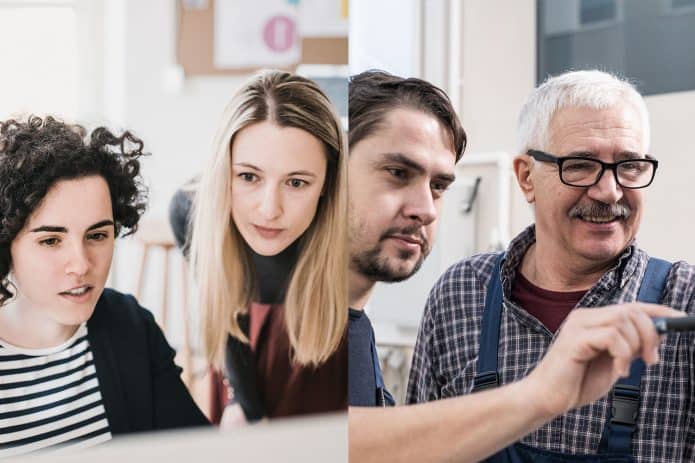Rikke Strandby has spent the past three years on the fringes of the labour market. Now, thanks to a successful match made through the EU project NextGen All Inclusive, she is permanently employed as the lunch lady at the Aarup-based company Micro Technic, working around three hours a day. Her arrival has not only lifted a heavy burden off several employees’ shoulders – it has also brought a greater sense of ease and coziness to the lunch break.
Two years ago, Rikke Strandby was diagnosed with ADHD – a condition that had gone undetected since childhood. Due to the diagnosis and stress-related symptoms that drained much of her energy, she has been unable to hold a traditional job with fixed hours. As a result, she spent three years outside the labour market and had gradually lost faith that it was possible to find a way back in.
“This summer, I had pretty much reached the point where I didn’t believe it was possible to find a place where I could fit in – and at the same time, where the job would feel meaningful,” Rikke recalls.
However, things took a big turn in October. Rikke landed a permanent job with the electronics company Micro Technic in Aarup. Since February, the company has had a lunch scheme, which about half of the roughly 65 employees take part in. The lunch setup had become a burden – particularly for the women working in administration.
Every day at lunchtime, food delivered by an external catering provider must be laid out twice, then cleared away and any leftovers distributed to employees who are part of the company’s food waste reduction initiative.
The task had mainly fallen on four administrative employees, who handled it on top of their regular responsibilities.
“It created a lot of unnecessary stress, because sometimes we remembered it at the last minute, and often it took longer than expected. That meant you didn’t get to the work waiting on your desk or had your flow interrupted,” explains Linda Drud Søgaard, Marketing and Sustainability Lead, who played a key role in Rikke’s recruitment process.
From Rikke’s perspective, the belief that she wouldn’t be able to fill a gap and become a valuable part of a workplace has been proven wrong.
“It’s always been made very clear to me that I was truly needed, and they’re incredibly good at checking in with me and sensing whether things are becoming too much,” she says.
Given the challenges Rikke deals with, simply getting out the door in the morning and arriving on time can be difficult and require extra effort.
“I often feel anxious – like I’ve forgotten something or like I’m not comfortable leaving home. There are definitely mornings where my first instinct is to close the curtains and pull the covers back over my head. But I don’t want to miss a day here. And having the flexibility to start a bit later in the morning really helps,” says the 38-year-old former nursery assistant.
Another challenge for Rikke is avoiding overstimulation. But here too, the job as lunch lady at the tech company is a perfect fit.
“I do have contact with others at work, which is good – I love talking to people – but it’s just the right amount, not so much that it exhausts me. I have my own little space down here around the kitchen, and that suits me perfectly.”
Rikke describes the match as “brilliant” and the job as “tailor-made” for her. And on top of that, it brings her a sense of financial freedom and stability that she hasn’t experienced in a long time.
“It was such a great feeling not to have to count every penny before Christmas. I was able to buy proper presents for my kids. Just having a steady income and being able to do something with it – that’s incredibly liberating,” says Rikke.
At Micro Technic, Linda Drud Søgaard is grateful for the smooth recruitment process, which was supported by Assens Municipality and the consultancy Ballisager – both partners in the NextGen All Inclusive project, alongside Business Hub Fyn and three other municipalities.
“We were spared the time-consuming task of finding the right candidates. Now that Rikke is up and running, we expect she’ll soon take full ownership of the lunch scheme. We work well together, and we can see that Rikke enjoys her work and her new role – she’s become a valued part of our community,” Linda explains.
Linda also believes it’s realistic that Rikke will take on more kitchen-related tasks over time – like ordering food, printing menus, preparing for meetings and coordinating guest catering. These are tasks that currently sit elsewhere in the organisation and take time away from other important administrative duties.
“This will never become a full-time role – nor should it – but we’re gradually adding more responsibility, and we can tell that Rikke is responding positively to it,” Linda says.
“I’m glad that in doing this, we can show both our own staff and other companies that it is possible to play an important role in a workplace even if you’re in a flex job or not able to work full time. There is room for people – even if they don’t fit into the same box as everyone else. You just need the right job – one that matches your abilities and the company’s needs,” she concludes.
